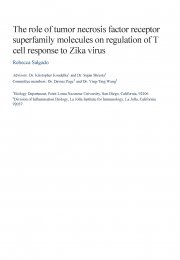- Resource Types
- Resource Languages
- Institutional Repository
 Visit the home page
Visit the home page
About Site Language
WHDL is viewable in multiple languages. Use the pull-down menu to select a language to view the site.
I changed my language, but I’m still seeing resources in the other languages?
If a resource or text has not been translated into your selected language, it will appear in the initially added language. We are always looking for help translating these resources. If you can help, contact us!
WHDL - 00011723


click to copy
Salgado, B (n.d.). The Role of Tumor Necrosis Factor Receptor Superfamily Molecules on regulation of T cell response to Zika virus .
Salgado, BeccaThe Role of Tumor Necrosis Factor Receptor Superfamily Molecules on regulation of T cell response to Zika virus . , n.d.
Salgado, BeccaThe Role of Tumor Necrosis Factor Receptor Superfamily Molecules on regulation of T cell response to Zika virus . , n.d.
Salgado, BeccaThe Role of Tumor Necrosis Factor Receptor Superfamily Molecules on regulation of T cell response to Zika virus . , n.d.
Zika virus (ZIKV) is a member of the Flaviviridae virus family and as of February 2016 has been declared a global public health emergency by the World Health Organization. Understanding the T cell response to ZIKV is critical in making steps towards developing vaccines and antiviral therapies. This project investigated the effect of tumor necrosis factor receptor (TNFR) superfamily members on T cell activation during a primary ZIKV infection. The T cell response was most aptly seen in wild-type C57BL/6J mice treated with an anti-Ifnar1 blocking antibody one day prior to infection. Expression levels of multiple TNFR superfamily members (BAFFR, CD30, ICOS, OX40, 4-1BB, CD27, GITR, and TNFR1) in both naïve and antigen specific T cells were analyzed over a variety of infection timepoints. In particular, expression levels of ICOS, GITR, and OX40 were higher in antigen-specific CD4+ and CD8+ T cells than naïve T cells at 5 days post infection. In terms of T cell kinetics of WT C57BL/6J mice treated with agonistic anti-OX40, anti-GITR, anti-OX40 and anti-GITR (combination), and isotype control antibody treatments 7 days post infection, there was a difference in the production of Granzyme B in antigen-specific CD8+ T cells in mice treated with agonistic anti-GITR and the combination agonistic anti-OX40 and anti-GITR antibody treatments. These findings warrant further study into the potential impact engaging OX40 and GITR could have on T cell response to ZIKV.
Arete: The PLNU Honors Journal
81 Resources
2022
2024
2025
2023
2024
2023
2023
2020
2021
2024